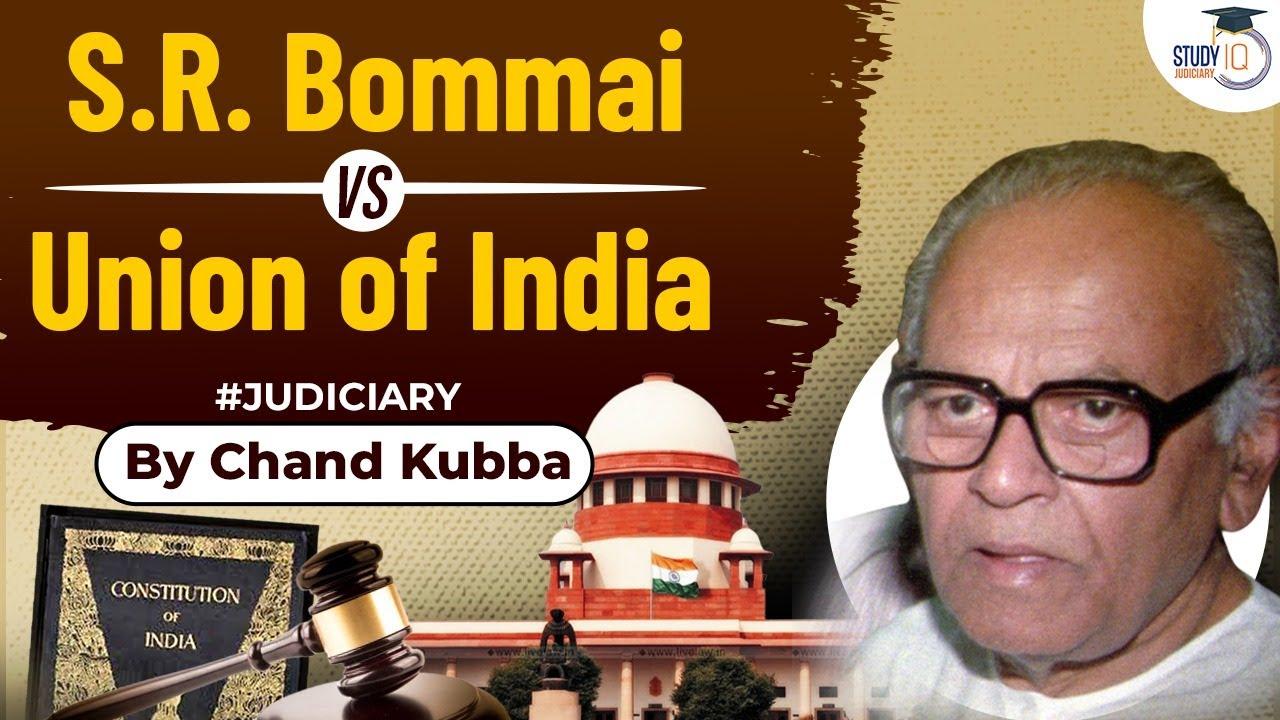Table of Contents
SR Bommai was the Chief Minister of Karnataka from August 1988 to April 1989.
- His Janta Dal government was dismissed on 21st April 1989 on the grounds that he had lost his majority and President’s Rule under Article 356 was imposed in Karnataka.
- he was denied an opportunity to prove his majority in the house.
- Ultimately he moved to the Supreme Court of India.
- In March 1994, a nine-judge constitutional bench of the SC gave the landmark judgement with respect to Article 356 and its arbitrary usage by the Central government.
Around the Same Time-
- President’s rule was also imposed in-
- Nagaland– August 1988,
- Meghalaya– October 1991
December 1992
- Madhya Pradesh,
- Rajasthan and
- Himachal Pradesh-
(2) Any such Proclamation may be revoked or varied by a subsequent Proclamation.
(3) Every Proclamation under this article shall be laid before each House of Parliament and shall, except where it is a Proclamation revoking a previous Proclamation, cease to operate at the expiration of two months unless before the expiration of that period it has been approved by resolutions of both Houses of Parliament
(4) A Proclamation so approved shall, unless revoked, cease to operate on the expiration of a period of 1 [six months from the date of issue of the Proclamation]:
In this case SC Discussed –
- 1) Whether the presidential rule proclaimed under article 356 is justified.
- 2) Whether the President enjoys unrestricted power to proclaim emergency under Article 356(1).
- 3) Whether the proclamation comes under the scope of Judicial review under Article 13.
- SC quoted Dr. B.R. Ambedkar who while speaking on Article 356 said- “the occasion for invoking these powers under the relevant Article would be very rare and that they would be remain a dead letter
Power of President under Article 356(1) is subject to Judicial Review
- SC Held that – The exercise of power by the President under Article 356(1) is subject to Judicial Review.
- Article 74(2) of the Indian Constitution states that the advice of council of ministers should never be asked to be revealed. But at the same time the court can call the material on the basis of which such decision has been taken as the material behind the satisfaction of the President as required under Article 356 is not barred.
- Prior to the judgement in this case, High Courts of various States been ruling out that the proclamation is outside the purview of Judicial Review
- Their judgements were based on the exemption clause provided under Article 74(2) of the Constitution
President by himself can only temporarily Suspend the Legislative Assembly-
- Article 356(1)(c) gives the President the powers to temporarily suspend the Legislative Assembly of a state and not dissolve it. The dissolution of the Assembly comes only after the majority approval of both the houses of the Parliament which is enshrined under Article 356(3) of the Indian Constitution to ensure the powers of the President are in check.
Court on Sarkaria Commission Report –
- The court accepted and endorsed the Sarkaria Commission Report of 1988 holding that the President should first issue warnings to the errant state which has failed/ denied to act as per the provisions of the Constitution, instead of directly exercising his powers under Article 356(1).
- In addition, with respect to the cases of no confidence, the Governor should first invite other parties to claim the majority in the house before directly calling upon the President to issue the proclamation of a state emergency.
Regarding Secularism-
- Supreme court held that the secularism is a basic feature of the constitution.
- If a party in the ruling state does not follow the basic structure of the constitution then it will be unconstitutional
- It would means that the government can’t be carried out as per the provisions of the constitution.
- As per the view of judges the addition of Secularism in the constitution is the act which made the fact explicit, which was in past an implicit.
Federalism
- Indian Constitution is Federal in character but with some unitary features since it gives more power to the central government instead of the federal/state government.
- However, the judges agreed on the point that the states are supreme in their sphere.
- The Hon’ble court held that the Federalism is the basic feature of the Indian constitution
- SC Declared the Proclamation in case of Karnataka and Meghalaya as Unconstitutional and restored the state government
- but the proclamation for the state of Madhya Pradesh, Himachal Pradesh and Rajasthan was not declared unconstitutional.
- Supreme Court also referred to the report of Sarkaria Commission which enlist the situation in which states the power of Article 356 could be proper or improper.
Download| Free PDF























 WhatsApp
WhatsApp